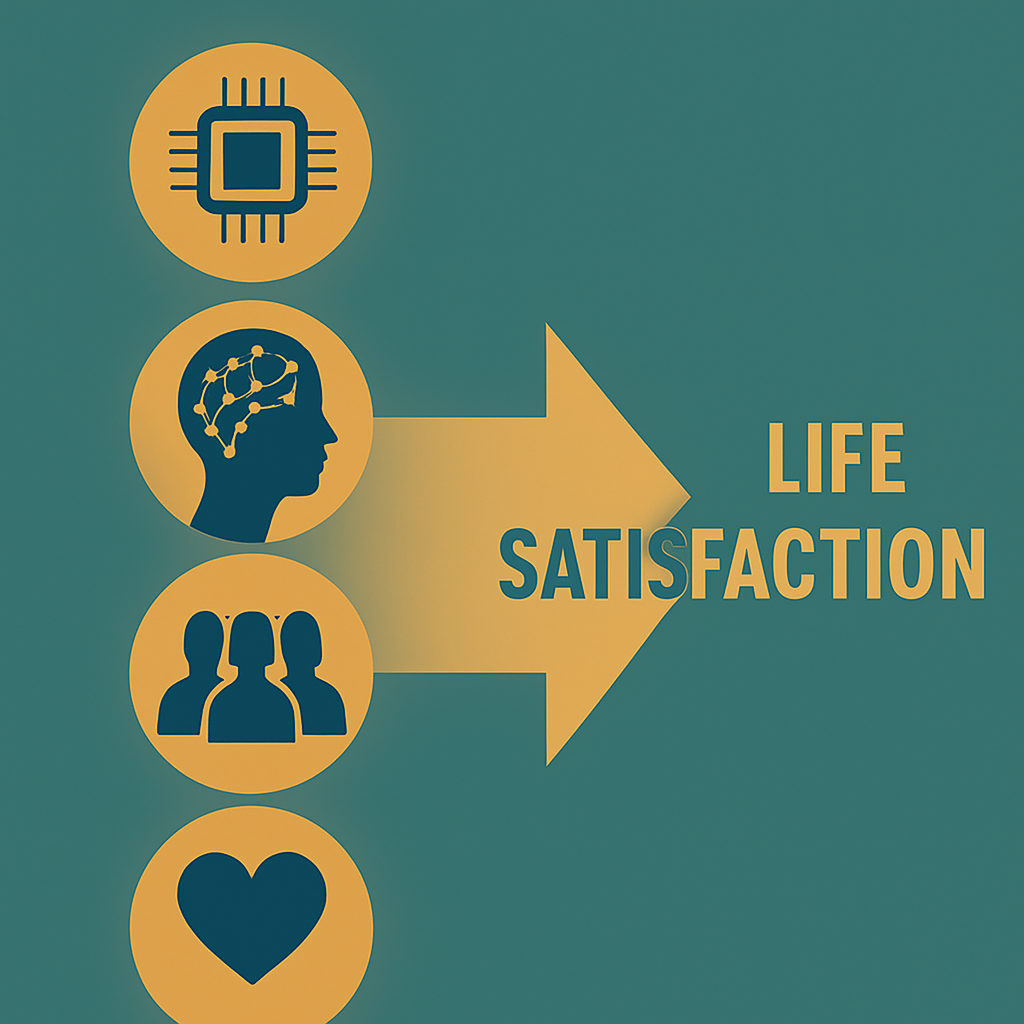|
Chapter 8: 4Capital and Life Satisfaction
 Life satisfaction is
a person’s overall evaluation of life as a whole, not just a
momentary feeling. It is influenced by resources, opportunities,
relationships, and values. 4Capital theory explains life
satisfaction through the
combination of four capitals—material, intellectual,
social, and spiritual—rather than any single factor alone. Life satisfaction is
a person’s overall evaluation of life as a whole, not just a
momentary feeling. It is influenced by resources, opportunities,
relationships, and values. 4Capital theory explains life
satisfaction through the
combination of four capitals—material, intellectual,
social, and spiritual—rather than any single factor alone.
What life
satisfaction means (brief)
Life
satisfaction differs from passing emotions. It is a reflective
judgment shaped by security, growth, belonging, and purpose. Short
spikes of pleasure do not guarantee a satisfying life; balanced
capabilities and healthy habits do.
How each
capital contributes
Material capital
Basic needs and safety come first. Adequate income, housing, food,
healthcare, and a margin for emergencies reduce stress. Beyond
sufficiency, more possessions add less to satisfaction unless they
support time, health, relationships, or service.
Intellectual capital
Learning, skills, and creativity support problem-solving and a sense
of progress. People value competence, autonomy, and the feeling of
getting better at things that matter. Curiosity and everyday
learning are practical engines of well-being.
Social capital
Trusting relationships and belonging are central. Family ties,
friendships, community participation, and reputation enable mutual
help and resilience. Bonding ties bring reliability; bridging ties
open opportunities and broaden perspective.
Spiritual capital
Purpose, values, and meaning give direction and strength. For
believers, this can be connectedness with God. For others, it is
commitment to noble purposes and moral standards. When values shape
habits, they become usable capital that sustains hope and integrity.
Why the
combination matters
• Money
without trust often produces anxiety and isolation.
• Knowledge without purpose can drift or harm.
• Community without resources struggles to meet needs.
• Purpose without learning and relationships may not translate into
action.
Everyday
examples (brief)
• A student
balances study (intellectual) with friendships and service
(social/spiritual), supported by a simple budget and sleep routine
(material).
• A family chooses
reliable housing and healthcare (material), sets shared rituals and
values (spiritual), builds neighborhood ties (social), and keeps
learning new skills for work and life (intellectual).
• An older adult nurtures purpose through volunteering (spiritual),
joins a walking group (social), learns basic tech skills to stay
connected (intellectual), and plans finances for stability
(material).
Common
confusions (clarified)
•
Happiness vs. life
satisfaction: pleasant feelings are part of life, but
long-term satisfaction depends on capabilities and purpose.
• Status vs. connection:
recognition fades; trusted relationships endure.
• Productivity vs. growth:
being busy is not the same as learning and improvement.
• Private belief vs.
public good: spiritual capital appears in
actions—integrity, compassion, and service—not only in beliefs.
Practical
reflections (light, optional)
•
Simplify finances to lower stress (material).
• Keep a learning habit—read, practice, reflect (intellectual).
• Show up for people and keep promises (social).
• Name your purpose and align weekly routines with it (spiritual).
Conclusion
A satisfying life arises from a
balanced 4Capital
combination: enough resources for security, opportunities
to learn and create, trustworthy relationships, and guiding purpose.
Investing in all four—together—supports durable well-being.
4Capital => life
satisfaction of individuals
4Capital =>
organizational performance
4Capital => country
development
Click HERE for a
presentation on measuring spiritual capital
Note: The work
presented here includes research conducted by Dr. Alex Liu at
Stanford University and that for the Global Entrepreneurship
Monitoring initiative. Dr. Alex Liu greatly benefited from valuable
discussions with several accomplished authors, including Danah
Zohar, author of 'Spiritual Capital'; Ernie Chu, author of 'Soul
Currency'; Theodore Roosevelt Malloch, author of 'Spiritual
Enterprise'; and Lawrence M. Miller, author of 'The New Capitalism'.
Note:
To cite us, please write "Liu, Alex. 4Capital and
Performance, RM Publishing, 2008, ResearchMethods.org,
https://www.researchmethods.org/4capital.htm.
|